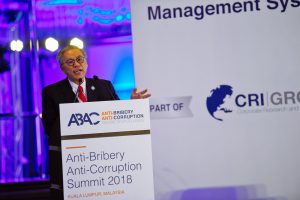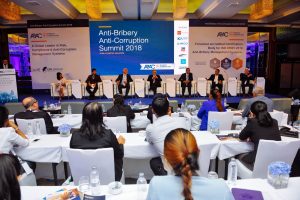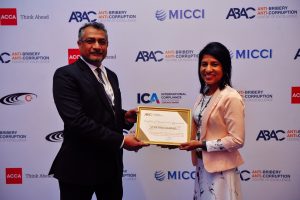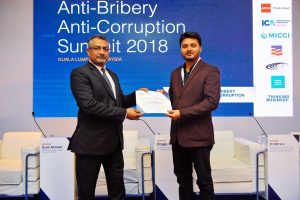Pharma and Healthcare Companies can Benefit from ISO 37001
Pharma and Healthcare Companies can Benefit from ISO 37001
When global pharmaceutical giant GlaxoSmithKline found itself in the Chinese government’s crosshairs for an alleged large-scale bribery scandal, there was perhaps little doubt that the consequences would be large-scale, as well. GSK was accused of systematically paying bribes and “gratuities” to doctors and hospitals in return for favourable product use and promotion. Pharma and Healthcare Companies ISO 37001 Benefits
China was in the midst of an emerging anti-graft campaign and imposed tough penalties against GSK and its executives: In the end, various company leaders were arrested and eventually given suspended prison sentences; GSK was fined $490 million; and the corporation published a statement of apology to the Chinese government and its citizens.
GSK’s fraud was arguably symptomatic of a widespread problem among pharmaceutical companies and healthcare providers (also called “life sciences” providers) with bribery and corruption in economies and healthcare markets around the world. Despite increased awareness of the problem and the application of sophisticated anti-fraud mechanisms, individual actors and agencies continue to defraud public and private health systems in the same ways exemplified by GSK in China.
Generally speaking, healthcare and pharma presents a target-rich environment for fraud. Quantitative data indicate that healthcare fraud has already risen starkly in recent years. The World Health Organisation (WHO) estimates that, where losses have been measured and the types of health expenditure have been covered, the average annual cost of fraud totals 7.29 per cent of healthcare budgets (Gee and Button, 2014). With rapidly ageing populations and the increased costs of providing long-term care, placing substantial pressure upon already overburdened health and social care sectors, healthcare spending will continue to increase worldwide. Unfortunately, this will also bring increased fraud schemes, as fraud perpetrators follow the money.
Bribery and corruption will continue to be a part of this upward trend in fraud. Certainly, not all cases are as broad and sweeping as GSK’s – in some cases, corruption occurs simply because the pharma or healthcare entity doesn’t have proper controls in place to uncover red flags. This also raises serious compliance issues in a landscape that has increasingly stringent regulations and enforcement measures to punish organisations that fail to implement proper anti-bribery and anti-corruption management procedures.
CRI Group investigates: Pharma corruption case included CFO
A major pharma company suspected bribery and corruption among some of its senior employees. The client’s corporate security department had received conflict of interest complaints that reportedly involved a range of employees, from sales personnel on up to the chief financial officer (CFO).
An outside investigation firm was called in launch a risk assessment of the company’s third-party relationships, which included several interviews with identified vendors and suppliers to help ascertain the engagement process and associated risks. This process uncovered the fact that the client had no policy or code of conduct concerning ethics, compliance and standards for appointment of vendors, suppliers and local agents. Most troubling was the fact that in most cases, senior management referred business opportunities to friends and family members.
Investigators found that one of the vendors, which was deeply engaged in procurements and the supply of services for the pharma company over the past five years, raised serious red flags. The vendor’s letterhead lacked a physical address, and the only contact information listed was a single cell phone number. It was clear this vendor warranted further investigation.
Investigators used site visits, background checks and interviews to determine that the suspicious vendor was not a company at all – but a single person. Not just any person, however – a public records check with a national database revealed that this individual, who was posing as a major vendor, was none other than the brother-in-law of the client company’s CFO. Worse still was the fact that this blatant fraud was being conducted right under the noses of procurement and finance professionals at this large and well-known pharma company.
The individual’s residence was being used as a warehouse to help facilitate the fraud. A comprehensive litigation records check found that he was previously convicted in federal court and spent three years in prison for the charges of selling counterfeit products, physician samples and expired medicines; further regulatory checks found that his pharmacist license had been cancelled.
A high fraud risk environment was created through the non-compliance of specific procurement rules, and a lack of integrity due diligence and proper risk management. Also, severe conflicts of interest were exposed, connected to high-level executive positions and benefiting those in positions of power.
The pharma company was exposed to highly unethical practices and could face regulatory and other government action. Furthermore, the company was at risk of civil and criminal investigations and liability, damage to its reputation, and loss in shareholder trust, all of which could adversely affect the company’s financial well-being.
A solution through ISO 37001:2016 ABMS
The case study above is not an outlier – such corruption cases are relatively common in such a broad and complex industry. The pharma company could have prevented the scandal altogether, however, had it proactively implemented a proper anti-bribery management system (ABMS). There is a solution that pharma and healthcare companies can implement to help prevent and detect bribery and corruption: the ISO 37001:2016 Anti-Bribery Management System standard. ISO 37001:2016 is designed to help global organisations implement an anti-bribery management system (ABMS), as the standard specifies a series of measures required by the organisation to prevent, detect and address bribery, and provides guidance relative to that implementation.
CRI Group’s ABAC Certification Services is fully accredited to offer independent ISO 37001:2016 certification to ensure that an organisation is in compliance with the standard, which is recognised and practised worldwide. CRI Group’s auditors and analysts work with pharma and healthcare companies to develop measures that integrate with existing management processes and controls, and include:
- Adopting an anti-bribery policy
- Establishing buy-in and leadership from management
- Training personnel in charge of overseeing compliance
- Communicating the policy and program to all personnel and business associates
- Providing bribery and corruption risk assessments
- Conducting due diligence on projects, business associates and other third-party affiliations
- Implementing financial and commercial controls
- Developing reporting and investigation procedures
In the case study outlined above, having such an ABMS in place would have detected the red flags of bribery and corruption before the scandal was able to proliferate and cause so much damage to the company. Risk assessments, in particular, would have uncovered the lack of due diligence procedures and alerted organisation leaders to the trouble areas that were points of opportunities for the CFO and his brother-in-law. Also, having proper due diligence procedures in place to vet and uncover fraudulent third-parties would have detected the problem with this vendor from the outset.
Once certified, an organisation must continue surveillance and undergo a recertification audit over three years to ensure that the organisation still complies with the ISO37001:2016 standard. During this time, any changes to processes and any new relationships with vendors and other third-party partners are carefully reviewed.
Long-lasting benefits of ISO 37001:2016 certification
ISO 37001 provides a strong framework for addressing and isolating risk factors, and the benefits of certification are far-reaching, impacting not just the primary organisation but also influencing contractors, clients, and raising the profile of the company as an ethical entity that is a good trading partner.
By achieving ISO 37001:2016 certification, a pharma or healthcare organisation will ensure that the organisation is implementing a viable anti-bribery management system utilising widely accepted controls and systems. It will also assure management, investors, business associates, personnel and other stakeholders that the organisation is actively pursuing internationally recognised and accepted processes to prevent bribery and corruption. Today, companies cannot afford to be reactive to threats of bribery and corruption. By achieving ISO 37001 Anti-Bribery Management System certification today, an organisation will remain in compliance and better positioned to address risks head-on.
Who is CRI Group?
Based in London, CRI Group works with companies across the Americas, Europe, Africa, Middle East and Asia-Pacific as a one-stop international Risk Management, Employee Background Screening, Business Intelligence, Due Diligence, Compliance Solutions and other professional Investigative Research solutions provider. We have the largest proprietary network of background-screening analysts and investigators across the Middle East and Asia. Our global presence ensures that no matter how international your operations are we have the network needed to provide you with all you need, wherever you happen to be. CRI Group also holds BS 102000:2013 and BS 7858:2012 Certifications, is an HRO certified provider and partner with Oracle.
In 2016, CRI Group launched Anti-Bribery Anti-Corruption (ABAC®) Center of Excellence – an independent certification body established for ISO 37001:2016 Anti-Bribery Management Systems, ISO 37301 Compliance Management Systems and ISO 31000:2018 Risk Management, providing training and certification. ABAC® operates through its global network of certified ethics and compliance professionals, qualified auditors and other certified professionals. As a result, CRI Group’s global team of certified fraud examiners work as a discreet white-labelled supplier to some of the world’s largest organisations. Contact ABAC® for more on ISO Certification and training.
Demonstrating Adequate Procedures with ISO 37001 ABMS Certification and Training
As the international outcry on bribery and corruption practices continues to tighten its grip around rogue players in the private and public business sectors, global organisations continue to ramp up their efforts to develop effective frameworks to prevent, detect and report bribery and corruption. And by fortifying their anti-bribery management systems, such organisations are further helping their cause as such systems can play a pivotal role in establishing “adequate procedures” as a compliance defense in the event of a bribery accusation.
“Adequate procedures” is a term made popular through the UK Bribery Act of 2010, which poses the potential of a company avoiding liability for failing to prevent bribery if that organization can demonstrate sound and established policies and procedures that deter individuals (inside and outside of the organisation) from partaking in questionable or corrupt conduct. A key challenge, though, is that “adequate procedures” takes on different meanings, depending on what country or jurisdiction one may reside. Further, most enforcement agencies and government authorities offer little guidance that pinpoints what exactly “adequate procedures” means when considered as a possible defense in a legal proceeding.
Consider two international legislative provisions that offer “adequate procedures” as a possible legal defense consideration along with the most recent National Anti-Corruption Plan of the Malaysian Government, and discover how a newly adopted international standard can offer multi-national organisations specific guidelines in developing a globally accepted anti-bribery management system that may support most “adequate procedures” defenses.
UK Bribery Act of 2010
Under the UK Bribery Act, an “adequate procedures” defense would be considered during an investigation into a corporate failure to prevent bribery. The Act provides commercial organisations with a defense to liability when commercial organizations can prove and demonstrate that they had in place proper procedures designed to prevent persons associated with them from undertaking bribery related conduct.
Consequently, corporations that are otherwise liable for violating the corporate failure to prevent bribery provision can escape criminal liability from the provision if they can prove that they had in place “adequate procedures” to prevent the relevant illegal conduct from occurring. This defense is unique in that it contends that corporations are acting in good faith and taking proper precautions throughout the organization in implementing adequate compliance procedures, and subsequently can avoid being held criminally accountable for the failure to prevent bribery. This defense is significant in that there is no such defense under the FCPA (see below) or most other foreign anti-bribery laws.
FCPA (U.S. Dept. of Justice)
While corporate compliance procedures are not considered in the liability phase of the FCPA, they are taken into account during the sentencing phase by the U.S. DOJ relevant to the FCPA. The United States Sentencing Commission outlines through its Federal Sentencing Guideline Manual six factors — four aggravating and two mitigating — that a sentencing court must consider in determining the appropriate penalty on organizations convicted under the FCPA. The existence of an effective compliance program is one of the two mitigating factors. Subsequently, an organization convicted of FCPA violations can use the existence of an effective compliance program to potentially reduce a penalty against it.
Malaysian National Anti-Corruption Plan 2019-2023
Under Section 17A (3) of the Malaysian Anti-Corruption Commission act, if the commercial organisation is found liable under the corporate liability provisions, a person who is the director, controller, officer or partner of the organization, or a person who is concerned with the organization’s management affairs at the time of commission of an offense, is deemed to have committed that offense unless such person can prove that the corrupt act was committed without his consent or connivance and that he exercised due diligence to prevent that commission of the offense as he ought to have exercised with regard to the nature of his function in that capacity and the circumstances.
Hence, there is a need for the company to put in place “adequate procedures” as a defense in case there is proven corruption by the associated individual. The Malaysian Anti-Corruption Commission MACC has issued guidelines which constitute “adequate procedures.” In the National Anti-Corruption Plan, Tun Dr. Mahathir bin Mohamad, Prime Minister of Malaysia on 29th January 2019 developed initiative number 2.1.3 which seeks “To introduce Anti-Bribery Management System (ABMS)MS ISO 37001 certification in all Government agencies” within two years (Jan 2019-Dec 2020). The guidelines further state in initiative 6.2.4 “To propose Anti-Bribery Management System (ABMS) MSISO 37001 certification as a requirement for State-Owned Enterprises (SOEs), Company Limited By Guarantee (CLBG) and the private sector to bid for Government contracts”.
In complying with these guidelines and to prove “adequate procedures”, public and private sector organizations should implement the ISO 37001 certification process which would provide proper assurance that the organization has succeeded in establishing, implementing, maintaining, reviewing and improving its Anti-Bribery Management System.
Demonstrating “Adequate Procedures” through ISO 37001 Certification
ISO 37001 Anti-Bribery Management System is an internationally accepted standard that specifies the procedures by which an organization should implement in preventing bribery while detecting and reporting any bribery incident that occurs.
The standard requires organizations to implement these procedures on a reasonable and proportionate basis according to the type and size of the organization, and the nature and extent of bribery risks faced. It applies to small, medium and large organizations in the public and private sector and can be implemented in any country. Though it will not provide absolute assurance that bribery will completely cease, the standard can help establish that the organization has in place reasonable, proportionate and adequate anti-bribery procedures.
ABAC® Center of Excellence Limited is fully accredited as a Conformity Assessment Body (Certification Body) to assist your organization in attaining ISO 37001 certification through a thorough bribery risk assessment and audit covering the entire scope of the standard The audit methodology is evidence-based, meaning any issues raised will be confirmed through adequate evidence that the ABAC Certification team has discovered during the audit.
Auditing techniques take a risk-based approach to examining your organization’s Anti-Bribery Management System (ABMS), and the ABAC Certification team will increase the scale of the investigation if they determine that a specific process presents on a higher risk side. Factors such as Impact, Negligence, Minor, Major, and Critical are taken into consideration during the audit.
A separate audit method is a process-based approach where the ABAC Certification examines the organization’s processes while considering the interaction between those processes. Finally, there is a sampling-based audit approach where ABAC Certification incorporates an appropriate sampling plan utilizing samples from different ABMS processes to conclude and support the audit findings and results.
The audit is extremely thorough in its approach, which results in an accredited certification for the scope of the ISO 37001 Anti-Bribery Management System. Because of the standard’s international acceptance and the thoroughness of the audit process, such certification can provide a valuable safeguard in demonstrating an “adequate procedures” compliance defense in cases posing a liability for a company’s failure to prevent bribery.
Indeed, from an FCPA perspective, certification may provide tangible evidence that a compliance program was in place at the time of the alleged bribery actions. And from a UK Bribery Act perspective, the certification could provide the company with tangible prima facie evidence presented by an accredited certification body attesting to the establishment and effectiveness of the organization’s compliance program. Notably, per Section 17A of the Malaysian Anti-Corruption Commission act, the Prime Minister’s National Anti-Corruption Plan 2019-2023 has declared ISO 37001 certification a requirement for companies operating in Malaysia.
There is a strong likelihood that ISO 37001 Anti-Bribery Management System will continue to set the pace for a globally recognized “adequate procedures” standard for corporations embroiled in corruption litigation proceedings. But for now, the most powerful “insurance” tool that public and private sector organizations can use in their defense strategy is ISO 37001 ABMS certification.
ABAC Certification is an accredited conformity assessment body in issuing ISO 37001:2016 certification, and an independent component of CRI® Group’s Anti-Bribery Anti-Corruption Center of Excellence, which was created to educate, equip and support the world’s leading business organizations with the latest in best-practice processes and procedures, providing world-class anti-bribery and anti-corruption solutions to organizations seeking to validate or expand their existing compliance frameworks to maintain a competitive edge in the world marketplace.
Zafar Anjum, MSc, MS, LLM, CFE, CIS, MICA, Int. Dip.(Fin. Crime), CII, MIPI, MABI | CRI® Group & ABAC® CEO
t: +44 207 8681415 | m: +44 7588 454959 | e: zanjum@CRIGroup.com
Let’s Talk!
If you have any further questions or interest in implementing compliance solutions, please contact us.
CRI® Group has safeguarded businesses from any risks, providing investigations (i.e. insurance fraud), employee background screening, investigative due diligence, business intelligence, third-party risk management, forensic accounting, compliance and other professional investigative research services. In 2016, CRI® Group launched Anti-Bribery Anti-Corruption (ABAC®) Center of Excellence – an independent certification body established for ISO 37001:2016 Anti-Bribery Management Systems, ISO 37301 Compliance Management Systems and ISO 31000:2018 Risk Management, providing training and certification. ABAC® operates through its global network of certified ethics and compliance professionals, qualified auditors and other certified professionals. Contact ABAC® for more on ISO Certification and training.
3 ways to protect your Company’s Reputation
In today’s connected business world, there are very few secrets. United Airlines, for example, recently learned the hard way that one ugly incident can go viral and spread around the world in a matter of minutes – not hours, days or weeks. protect company reputation
United initially faced criticism over the rough treatment of a passenger being removed from one of their planes. Then, the company learned a second lesson when its CEO’s response to the crisis seemed somewhat disconnected and uncaring. United was in the middle of a reputational crisis, and its first official response to angry consumers only added more fuel to the fire. Later, the CEO offered an apology and a more compassionate statement – but the damage was done.
There are lessons to be taken from this and other high-profile cases where companies have seen their reputation, which they’ve worked hard to cultivate, trashed in the public spotlight. The fact is, things happen, and no company has a guaranteed way to safeguard their reputation from ever being dinged or facing scrutiny, whether fair or not. But there are ways to mitigate the damage and help ensure your company survives the crisis, and can rebuild its reputation in a positive way.
Know that people are talking about you
In the age of Twitter, Facebook, Yelp and other social engagement sites, people are keen to talk about what they like, dislike, what they wish would be better, and anything else on their mind. That includes your company and your products or services. Accept this and embrace it. Engage with people who post on social media when appropriate, and always in a polite and respectful manner. When there is a legitimate problem, communicate that you are taking the matter seriously and looking to resolve it, and then do so.
1. Be transparent
A way to be proactive in your engagement with others is to ask for feedback. Then be prepared to address it, good or bad. Consumers, stakeholders and even your own employees will be impressed by the open lines of communication and an honest dialog. In this way, you can strive to improve your services and offerings and show that you are receptive to your client’ needs.
2. Protect your customers’ data
Nothing can destroy your reputation among your clients and customers quicker than having to tell them their personal information, which was entrusted to you to remain private and protected, is now in the hands of hackers or criminals because you suffered a security breach. Even worse is when they learn that your company did not take all the measures necessary, or even the most basic ones, to prevent such a breach from occurring. Not only might you be criminally liable, but customers will run from you, not wanting to take a risk that something like that could happen again in the future. In today’s high-risk environment, you must have the most sophisticated and up-to-date security measures in place to protect your date – and your reputation.
3. Conduct due diligence
How much do you know about your third-party partners – those suppliers and contractors that you’ve trusted for years, or new ones with whom you seek to engage? An unethical partner can have serious effects on your own company’s reputation – bribery, corruption, supply chain problems are all issues that can end up tainting your own business and causing your customers to lose trust in your products or services. Conducting thorough due diligence, with background checks and full risk assessments, is the only way to help protect your reputation from potential harm.
It may feel sometimes like your company’s reputation is out of your control. However, there are steps you can take to help manage your reputation and help steer the conversation. It becomes more difficult when you wait, and try to undo later the damage that has already been done. That’s why being proactive in maintaining a positive reputation is the best strategy. Contact CRI Group today and let us help you stay on the path to managing your message and your reputation.
Who is CRI Group?
Based in London, CRI Group works with companies across the Americas, Europe, Africa, Middle East and Asia-Pacific as a one-stop international Risk Management, Employee Background Screening, Business Intelligence, Due Diligence, Compliance Solutions and other professional Investigative Research solutions provider. We have the largest proprietary network of background-screening analysts and investigators across the Middle East and Asia. Our global presence ensures that no matter how international your operations are we have the network needed to provide you with all you need, wherever you happen to be. CRI Group also holds BS 102000:2013 and BS 7858:2012 Certifications, is an HRO certified provider and partner with Oracle.
In 2016, CRI Group launched Anti-Bribery Anti-Corruption (ABAC®) Center of Excellence – an independent certification body established for ISO 37001:2016 Anti-Bribery Management Systems, ISO 37301 Compliance Management Systems and ISO 31000:2018 Risk Management, providing training and certification. ABAC® operates through its global network of certified ethics and compliance professionals, qualified auditors and other certified professionals. As a result, CRI Group’s global team of certified fraud examiners work as a discreet white-labelled supplier to some of the world’s largest organisations. Contact ABAC® for more on ISO Certification and training.
Why should you want your partners to be ISO 37001 certified?
We at the CRI Group believe that businesses that are being run free of corruption accomplish their vision and mission sooner and easier. They bring good to the world more effectively than others. When a business has a clearly set vision and a detailed plan on how to reach it, all it takes to accomplish it is to stick to the plan. However, since companies have to cooperate with other companies in their regular work, they don’t have a choice but rely on someone else’s ethics and principles of doing business. But we all know that business partners are not always reliable. Starting cooperation with one requires conducting thorough due diligence of their work before doing any serious business with them.
The risks could be enormous when your potential partners are involved in criminal activities. Unfortunately, white-collar crimes are not eradicated from the business world, especially when it comes to corrupt activities. Many acts of corruption are often in some kind of gray area – maybe they are legal, maybe not, but certainly are not ethical. In such circumstances, some businessmen don’t hesitate to reach for methods that don’t comply with your legal and ethical standards. If you are cooperating with such partners, you know that risks for your companies are huge. Not only because unknowingly you could be involved in corrupt practices and be investigated by law enforcement authorities, but also because they ruin your reputation and make other potential partners avoid working with you. You are aware that a mistake in choosing business partners can be very costly for your business. Sometimes these risks are easy to mitigate, but some of them could bring your company on the edge of shutting down.
This is where the ISO 37001 standard helps. If you get certified, that would mean implementing numerous anti-bribery standards that will protect your business from bribery. By requiring your partners be certified as you are, you show your preference to cooperate with partners who tackle bribery as well. That speaks of your values as a company. It will let the world know that your anti-bribery values don’t serve just to take space on the Values section on your company’s website, but you are dedicated to putting them in practice as well.
What is required of ISO 37001 certified companies?
Certifying with ISO 37001 means that a third-party such as ABAC® has checked out on the company and confirmed that your partners have implemented the following anti-bribery standards:
- Annual and continuous risk-assessment
- Anti-bribery policies and procedures, including those for hospitality, gift-giving, and donations
- Anti-bribery training for employees
- Procedures for reporting and investigating cases of bribery in the company
- A compliance team to oversee implementation of anti-bribery measures
- Policies and procedures for mitigating the risk of bribery
- Safe channels for reporting bribery by whistleblowers
- The proper due diligence of third parties
- Continuous corrections of anti-bribery policies and procedures
- The commitment of top management to tackle bribery in their own company
- Risk-rating system for third parties
What does this mean for you when you cooperate with others?
Requiring your partners to be ISO 37001 certified will bring the following benefits for you:
It will protect you from potential bribery practices. Although implementing the ISO 37001 standard doesn’t necessarily mean that no one will ever try to ask or offer bribes, the mere implementing of the standards will make that very difficult to occur. If both you and your partners are certified, it’s unlikely that corrupt practices related to bribes will happen in your cooperation.
It will be easier to onboard new partners. Starting cooperation with a new company for which you don’t know how reliable it actually is will require doing a thorough due diligence analysis. If both of you are ISO 37001 certified by a third party, at least for the anti-bribery part, you’ll be sure from the start that the other party operates by the same standards as you.
You’ll have peace of mind when cooperating with your partners. You’ll know that someone knowledgeable of anti-bribery standards has confirmed that your new partner is ethical and doesn’t pose a threat to your company.
If you haven’t certified your company with the ISO 37001 Anti-bribery Management Systems standards yet, but you want to show your potential partners that you are serious about running a bribery-free business, contact us by filling this form. We will answer your certification inquiries as soon as possible.
Protect Your Business from Money Laundering Activities
How to Protect Your Business from Money Laundering Activities?
Today, having anti-money laundering processes in place is more than a matter of smart business. In most jurisdictions, it is also a legal necessity.
Organisations large and small are at risk of falling prey to unscrupulous business dealings and other threats posed by seemingly legitimate business partners. Governments and regulatory agencies are now placing the responsibility of avoiding these pitfalls on the owners and directors of the organisations themselves.
Take Citibank, for example. The banking giant has been fined $70 million in the U.S. “for failing to address shortcomings in its anti-money laundering policies.” According to an article by Reuters, titled “Citibank fined $70 million for anti-money laundering compliance shortcomings” (2018):
The Office of the Comptroller of the Currency fined the bank in late December and announced it on Thursday. The regulator assessed the civil penalty because the bank had failed to address concerns it had first flagged in 2012.
The case is notable because it isn’t linked to a specific new allegation of money laundering per se. It is the alleged lack of compliance and efforts to enhance prevention policies that placed Citibank in hot water (you can read additional commentary on this case in the Bloomberg opinion piece).
Citibank isn’t alone. Western Union just settled a case for nearly as much ($60 million) for allegedly failing to deter and report transactions related to money laundering. Rather than the federal government, this settlement is with the New York Dept. of Financial Services. According to an article by Reuters, titled “Western Union settles New York money laundering probe for $60 million” (2018):
DFS alleged that from 2004 to 2012, Western Union failed to implement and maintain an effective anti-money laundering program aimed to deter criminals’ use of its electronic network to facilitate fraud and money laundering.
The regulator said senior Western Union executives and managers also ignored suspicious transactions to Chinese Western Union locations by several high-volume agents, including money transfers linked to human trafficking.
DFS Superintendent Maria Vullo said in a statement Western Union’s executive “put profits ahead of the company’s responsibilities to detect and prevent money laundering and fraud.”
CRI Group can help
The best way to prevent and detect money laundering is to have a robust set of anti-money laundering (AML) processes in place. CRI Group’s Investigative Due Diligence services provide clients with the specialised intelligence needed to guarantee complete compliance with anti-money laundering regulations and AML legislation involving trans-national implications.
The impact of not remaining in compliance can be severe, and might include the following:
- Damaged corporate reputation and brand devaluation
- Eroded employee moral
- Potential consumer boycotts
- Negative investor perceptions
- Possible legal action
- Fines and potential jail terms for directors
Anti-money laundering laws and regulations are constantly being strengthened as governments come under pressure to protect their economy and taxpayers from the damage caused by this widespread crime. Today, organisations must be diligent in protecting themselves, their investments, their reputations – and they must be fully compliant with the law. Contact CRI Group and be better protected against the risks of money laundering today.
Who is CRI Group?
Based in London, CRI Group works with companies across the Americas, Europe, Africa, Middle East and Asia-Pacific as a one-stop international Risk Management, Employee Background Screening, Business Intelligence, Due Diligence, Compliance Solutions and other professional Investigative Research solutions provider. We have the largest proprietary network of background-screening analysts and investigators across the Middle East and Asia. Our global presence ensures that no matter how international your operations are we have the network needed to provide you with all you need, wherever you happen to be. CRI Group also holds BS 102000:2013 and BS 7858:2012 Certifications, is an HRO certified provider and partner with Oracle.
In 2016, CRI Group launched Anti-Bribery Anti-Corruption (ABAC®) Center of Excellence – an independent certification body established for ISO 37001:2016 Anti-Bribery Management Systems, ISO 37301 Compliance Management Systems and ISO 31000:2018 Risk Management, providing training and certification. ABAC® operates through its global network of certified ethics and compliance professionals, qualified auditors and other certified professionals. As a result, CRI Group’s global team of certified fraud examiners work as a discreet white-labelled supplier to some of the world’s largest organisations. Contact ABAC® for more on ISO Certification and training.
How to Protect Your Business From Money Laundering Activities
Money laundering should be near the top of the list of any business owner’s concerns. Anti-money laundering legislation and regulations are strict and increasingly enforced, and remaining in compliance through implementing proper prevention controls is a must. Countless businesses large and small – from corporations to third-party contractors – have learned this lesson the hard way. Take Citibank, for example. The banking giant was recently fined $70 million in the U.S. “for failing to address shortcomings in its anti-money laundering policies” (Reuters, 2018). It was the Office of the Comptroller of the Currency that levied the fine against the bank because it had allegedly failed to address money laundering concerns that were first flagged five years earlier.
The case is notable because it isn’t linked to a specific new allegation of money laundering per se. It is the alleged lack of compliance and efforts to enhance prevention policies that placed Citibank in hot water (Bloomberg, 2018).
Money Laundering Cases in the News
Citibank isn’t alone. Other recent high-profile cases serve as warnings to companies that aren’t taking money laundering prevention seriously:
- Pakistan’s biggest lender, Habib Bank Ltd, was fined $225 million by the New York State Department of Financial Services (DFS) for failures over anti-money laundering and sanctions rules at its single U.S. branch. (Reuters, 2017). According to media reports, the DFS was previously seeking to impose a fine of up to $630 million, the largest ever faced by a Pakistani financial institution, for “grave” compliance failures.
- Western Union, accused of failing to deter and report transactions related to money laundering, settled its case with the DFS for $60 million (Reuters, 2018). From 2004 to 2012, Western Union allegedly failed to implement and maintain an effective anti-money laundering program aimed to deter criminals who were using its electronic network. The company also allegedly ignored suspicious transactions to locations in China by several high-volume agents (including money transfers that were linked to human trafficking).
- French bank watchdog ACPR fined Société Générale, one of France’s largest banks, 5 million euros for a number of alleged shortcomings in its money laundering and terrorism financing prevention controls (Reuters, 2018). Also, a French investigator sent documents to Brazil prosecutors that suggest Société Générale might have breached money laundering rules in the alleged corruption surrounding the selection of Rio de Janeiro as the host for the 2016 Olympics (New York Times, 2017). The allegations involve payments from a Brazilian businessman to the son of a former Olympic Committee member – the payments were allegedly routed through Société Générale accounts.
Money Laundering’s Lasting Harm
Anti-money laundering (AML) efforts by regulatory bodies worldwide are serious business. Multinational organisations, and especially financial institutions, must employ the toughest AML compliance controls and standards to avoid the risk of even appearing to run afoul of AML laws. That’s why CRI Group advises clients to have robust AML controls in place, especially when dealing in business overseas, and entering into any new partnerships or mergers.
The impact of corruption and money laundering allegations are often severe, and can include:
- Damaged corporate reputations and brand devaluation
- Eroding employee moral
- Potential consumer boycotts
- Negative investor perceptions
- Possible legal action
- Fines and potential jail terms for directors
The best way to prevent and detect money laundering is to have a robust set of anti-money laundering (AML) processes in place. CRI Group’s Investigative Due Diligence services provide the specialised intelligence needed by global financial institutions and multinational corporations to guarantee complete compliance with anti-money laundering (AML) regulations and legislation involving trans-national implications.
Strategies to Combat Money Laundering
As part of any system of anti-money laundering controls, there are some common-sense elements that can help keep an organisation better protected. CRI Group founder and CEO Zafar Anjum said that it’s important that companies take a top-down approach to prevent money laundering because in today’s climate, they cannot afford to take a blind eye.
“The days when companies could plead ignorance to money laundering activities taking place among their business transactions are over,” Anjum said. “Governments have been clear with new laws and regulations that they expect a proactive effort to prevent money laundering and terrorist financing, and they will prosecute organisations and their personnel who don’t meet this expectation.
“To take things a step further, most international companies are performing due diligence and taking careful measures not to partner with organisations that are high on the money laundering risk scale, because that would increase their exposure,” Anjum said. “Being in compliance isn’t just a sound legal strategy – it’s also good business.”
By adopting policies and procedures aimed to prevent money laundering and terrorist financing, companies will enhance their efforts to be on the right side of compliance. A few of these policies include:
- Scrutinising unusually large and/or complex transactions. Systems should be automated to flag these types of transactions for review to determine their purpose and legitimacy.
- Reviewing odd patterns of transactions. Sometimes smaller transactions can reveal a pattern of illegal activity related to money laundering or terrorist financing; AML software will flag such patterns of possible abuse for review.
- Disallowing anonymity among financial transactions. This common-sense protocol can help discourage and prevent money laundering activities, as anonymity is the shield through which most suspicious actors hide their financial activities.
- Identifying clients who might be politically exposed persons (PEP). PEPs are recognised as such by the Financial Action Task Force (FATF), an independent inter-governmental body that develops and promotes policies to protect the global financial system against money laundering, terrorist financing and the financing of proliferation of weapons of mass destruction.
- Conducting client due diligence. Within the boundaries of a jurisdiction’s privacy laws, the organisation should perform due diligence on high volume clients to verify their identities, business purposes and business relationships.
- Maintaining complete and thorough records. This includes clients, transactions, and due diligence findings that should be kept on file for at least five years.
- Training employees. As with all areas of fraud prevention, the front line against money laundering is the organisation’s staff. Employees should be aware of anti-money laundering and anti-terrorist financing laws and regulations, and their personal responsibility in helping the organisation remain in compliance. Expert training and certification should be provided on a scheduled basis to keep employees knowledgeable about changes in the law, new threats and updates to control procedures.
Ensuring compliance is a responsibility that must be embraced and managed at the senior level of the company. Anjum, a 27-years veteran in fraud prevention, protective integrity, security and compliance, said this includes communicating the policies and procedures – as well as the results: “If there are areas to improve, management must take the lead in recognising those weaknesses and developing strategies to address them,” Anjum said.
CRI Group has a vast offering of services to help organisations stay ahead of the curve with anti-money laundering measures and the processes required to remain fully in compliance with applicable laws and regulations, giving companies, their business partners and their clients the confidence of knowing that the organisation, and its reputation, is protected from the negative consequences of money laundering.
Anti-money laundering laws and regulations are constantly being strengthened as governments come under pressure to protect their economy and taxpayers from the damage caused by this widespread crime. Today, organisations must be diligent in protecting themselves, their investments, their reputations – and they must be fully compliant within the law. Contact CRI Group and be better protected against the risks of money laundering today.
Thank you for attending our ABAC 2018 Malaysia Summit
Thank you for attending the ABAC Summit Malaysia last Tuesday! We are proud to have brought such an amazing group of distinguished speakers and respected delegates together to address the bribery and corruption issues worldwide. We are extremely thankful to all our speakers for making this #ABACSummit2018 a successful one!
Dr KM Loi, Cristian Nicoara, Md Alimuddin Rahim, Uzair Ahmed, Cynthia Gabriel, Mohd Nur Lokman Bin Samingan, Drago Kos – your contribution of knowledge and time is highly appreciated of everyone fighting bribery and corruption worldwide.
Respected delegates – we are extremely happy you joined us for the Summit and we hope this event helped you in more ways than one. Please take a moment to help us improve future events by taking a brief 40 seconds survey. Your feedback is extremely valuable to our ongoing effort to deliver anti-bribery anti-corruption events targeted to meet your needs and expectations. Download the presentations of the distinguished Anti-Bribery Anti-Corruption speakers at ABAC Summit 2018 here.
Together we can stand up against corruption – see you next time at ABAC Summits, organised by CRI® Group in partnership with ABAC® Center of Excellence.
Photos of ABAC Summit Malaysia 2018
- Happening now: CRI® at SHRM17 in New Orleans
Who is CRI® Group?
Based in London, CRI® Group works with companies across the Americas, Europe, Africa, Middle East and Asia-Pacific as a one-stop international Risk Management, Employee Background Screening, Business Intelligence, Due Diligence, Compliance Solutions and other professional Investigative Research solutions provider. We have the largest proprietary network of background-screening analysts and investigators across the Middle East and Asia. Our global presence ensures that no matter how international your operations are we have the network needed to provide you with all you need, wherever you happen to be. CRI® Group also holds BS 102000:2013 and BS 7858:2012 Certifications, is an HRO certified provider and partner with Oracle.
In 2016, CRI® Group launched Anti-Bribery Anti-Corruption (ABAC®) Center of Excellence – an independent certification body established for ISO 37001:2016 Anti-Bribery Management Systems, ISO 37301 Compliance Management Systems and ISO 31000:2018 Risk Management, providing training and certification. ABAC® operates through its global network of certified ethics and compliance professionals, qualified auditors and other certified professionals. As a result, CRI® Group’s global team of certified fraud examiners work as a discreet white-labelled supplier to some of the world’s largest organisations. Contact ABAC® for more on ISO Certification and training.
Corruption won’t stop: is your organisation protected?
In one case, an enforcement agent for a Malaysian government department pleaded guilty for receiving a bribe from a business owner. In another, a U.S. district attorney from Philadelphia was accused of taking cash in return for helping people with their legal cases. He was accused of 28 counts of bribery, and in the end was given a deal to plead guilty on one count. Both cases show how easy it is for organisations to fall victim to bribery and corruption.Businesses, non-profits, government organisations both face a risk to their financial well-being and reputation.
In Malaysia, the case centred around an employee of the Domestic Trade, Cooperatives and Consumerism Ministry. According to the article “Domestic Trade enforcement staff fined RM1,200 for bribery” published in the New Straits Times, Muhammad Mat Sa’ad, 36, was charged with taking bribes from a fuel storage owner in 2014. His case was prosecuted by the Malaysian Anti-Corruption Commission (MACC).
In the U.S., Philadelphia’s top law enforcement officer, District Attorney R. Seth Williams, pleaded guilty to bribery in a more sweeping case with some very troubling details. According to the New York Times article “Philadelphia District Attorney Pleads Guilty to Bribery and Resigns,” Williams allegedly accepted bribes from business people in return for offers of legal help with their cases or those of their friends. But he may have also defrauded his own mother.
The article states:
“Mr. Williams accepted gifts including a trip to the Dominican Republic and checks for thousands of dollars from people who wanted favours, prosecutors said. According to an indictment by the United States attorney’s office for New Jersey, he promised one of the business people that he would “look into” a case that had been brought against a friend of that person.
He also faced charges including wire fraud and extortion for his alleged personal use of political action committee funds and government vehicles. Among the most damaging charges against Mr. Williams was that he defrauded a nursing home and family friends of money that was designated for the care of his mother.”
He faces a up to five years in prison and a fine of up to $250,000.
These types of troubling cases can likely be prevented with the right training, internal controls, and certification. The International Organization for Standardization (ISO) issued the ISO 37001:2016 Anti-Bribery Management System standard to help companies worldwide increase and measure their efforts against bribery and corruption.
CRI® Group is registered as a foremost ISO 37001:2016 Certification Body with the Dubai Accreditation Center (DAC) Government of Dubai, UAE, and has formally launched its ISO 37001:2016 Anti-Bribery Management Systems certification program. ISO 37001:2016 certifies that your organisation has implemented reasonable and proportionate measures to prevent bribery. These measures involve top-level leadership, training, bribery risk assessment, due diligence adequacy, financial and commercial controls, reporting, audit and investigation.
Through CRI® Group’s 3PRM-Certified™, the ISO 37001:2016 Anti-Bribery Management System Certification will help your company, organisation or department to reduce risk of bribery and corruption by establishing, implementing, maintaining and improving your management system. The certification empowers you with the ability to safeguard and maintain the integrity of your company by:
- Guaranteeing that all workers and agents are devoted to the latest anti-bribery practice.
- Regularly validating compliance to appropriate legislation like the FCPA and UK Bribery Act 2010.
- Jointly cooperating with stakeholders to observe and reduce the risks throughout your supply chain.
- Externally scrutinising your company, testing the effectiveness of your anti-bribery policies and processes.
- Creating “Compliance in Action.”
ISO 37001:2016 Anti-Bribery Management System certification is offered under CRI® Group’s ABAC® Centre of Excellence, an independent certification body established for Anti-Bribery Management System training and certification, ISO 37301 Compliance Management Systems and Risk Management System certification. The program will be tailored to your organisation’s needs and requirements. For assistance in developing and implementing a fraud prevention strategy, contact ABAC® today or get a FREE QUOTE now!
Who is CRI® Group?
Based in London, CRI® Group works with companies across the Americas, Europe, Africa, Middle East and Asia-Pacific as a one-stop international Risk Management, Employee Background Screening, Business Intelligence, Due Diligence and other professional Investigative Research solutions provider. We have the largest proprietary network of background-screening analysts and investigators across the Middle East and Asia. Our global presence ensures that no matter how international your operations are we have the network needed to provide you with all you need, wherever you happen to be. CRI® Group also holds BS 102000:2013 and BS 7858:2012 Certifications, is an HRO certified provider and partner with Oracle.
In 2016, CRI® Group launched Anti-Bribery Anti-Corruption (ABAC®) Center of Excellence – an independent certification body established for ISO 37001:2016 Anti-Bribery Management Systems, ISO 37301 Compliance Management Systems and ISO 31000:2018 Risk Management, providing training and certification. ABAC® operates through its global network of certified ethics and compliance professionals, qualified auditors and other certified professionals. As a result, CRI® Group’s global team of certified fraud examiners work as a discreet white-labelled supplier to some of the world’s largest organisations. Contact ABAC® for more on ISO Certification and training.
Any successful ethics and compliance strategy needs 5 key ingredients …
Once upon a time, the idea of business ethics was more of an abstract or philosophical notion that seemed more suited for discussion in a university lecture or at a business conference. Today, however, organisations of all sizes and industries must have concrete ways of addressing ethics and compliance issues as a principal component of their business processes and strategy.
According to a study by PwC, 98 per cent of senior leaders say they’re committed to compliance and ethics; however, only 67 per cent have a process in place to identify the owners of compliance and ethics-related risks, with only a third having an officer in place for the overall compliance and ethics. Fifty-six per cent of the companies don’t have a chief ethics officer at all, and only 20 per cent have a Board of Directors that formed separate compliance and ethics committees. The study reports that 82 per cent of leaders communicated with employees on ethics, but 46 per cent of this is done in business meetings or by email. You can read the result on the full PwC website.
Business leaders are usually quick to communicate their expectations to employees, especially when it comes to financial goals or tasks that they want to be accomplished. However, what is often lacking is a clear, concise explanation of what the organisation expects regarding ethical behaviour and a compliance framework in place to follow. Today citizens, media, politicians and international bodies across all regions actively condemn abuses of power. And past scandals and their consequences have created a demand for increased regulations, greater transparency, and other rigorous scrutiny measures to be taken. To maintain (or regain) public trust, the ethics and compliance function has been placed at the centre of the strategic core of organisations by effective leaders.
Empower your organisation to mitigate risk!
To ensure a robust compliance and ethics strategy, five critical elements need to be implemented; 1) tone at the top; 2) corporate culture; 3) risk management, 4) a Chief Compliance Officer; and 4) testing and monitoring.
1 – Building Tone at the Top
“Tone at the top” is a term used to describe the ethical atmosphere created at an organisation or workplace by their leaders and their attitudes and behaviours. Tone at the top is vital in determining whether fraud, bribery, or corruption are likely to occur. Because all levels of management set it, it has a trickle-down effect on all employees. If the top leaders show a robust and zero-tolerance approach to fraud, employees are likely to lead by example.
An organisation with a strong ethical culture is usually led by a board of directors and senior management personnel who actively promote a culture of compliance and zero tolerance for fraud and other unethical business behaviour. Effective tone at the top will communicate to the organisation at all levels the expected type of conduct, what is considered unacceptable, and what the consequences will be for transgressions. A zero-tolerance approach should be followed at all times; it is vital in maintaining the culture of ethics and compliance at the organisation; below are some examples of failed tone at the top:
- The Enron scandal
- Arthur Andersen obstruction of justice
- Xerox fined by SEC
- Scandals at Fannie Mae
- Global financial crisis
- Tyco Scandal
- MCI Inc/WorldCom
- ImClone Systems trading case
For more scandals, check out our list of the “Top 10 Bribery & Corruption Stories of 2020“.
2 – Corporate culture
The prevailing norms, expectations, and recognised acceptable behaviour form the corporate culture of an organisation. By implementing an ethical code of conduct and compliance with all regulations a part of those norms, the organisation will help promote positive behaviour and integrity among its staff.
You might be making assumptions that your employees know how to conduct themselves ethically when, in fact, this expectation only exists in a grey area in their minds – if at all. Some employees who have engaged in fraud, corruption or other unethical situations have claimed that while they knew their behaviour was wrong, they thought it was implicitly accepted by their bosses and, in some cases, their company on the whole.
Similar to establishing an effective tone at the top, fostering a positive corporate culture hinges on effective communication, and it needs to permeate different layers of the organisation. In other words, sending occasional emails about ethical behaviour isn’t enough to influence the culture at a company. Develop videos, team-building exercises, new employee orientations, and employee appreciation events; these provide opportunities to recognise positive behaviour and reinforce the company’s values. When employees see their colleagues being recognised and rewarded for maintaining a compliant and ethical corporate culture, they are more likely to help cultivate an ethical workplace. When the tone at the top and corporate culture are tied together, everyone understands what is acceptable and expected in being a part of the organisation’s success.
3 – Risk management: perform risk assessments
Risk management is identifying, evaluating, and prioritising risks (defined in ISO 31000 as the effect of uncertainty on objectives) followed by coordinated and economical application of resources to minimise, monitor, and control the probability or impact of unfortunate events to maximise the realisation of opportunities. In other words, before you establish an ethics and compliance framework – first, a risk assessment should be conducted to uncover any vulnerabilities that need to be addressed with new processes.
> Risk assessment breakdown: Identification, Analysis, Evaluation
This means you need to assess how your business is conducted. So ask yourself:
- Have the various roles at the company been appropriately allocated, and is there a proper separation of duties?
- Are employees qualified for their responsibilities?
- Is the workforce trained to recognise the red flags of unethical behaviour and fraud?
Once the risks are identified, they can be isolated and addressed as part of your organisation’s comprehensive approach to ethics and compliance. The risks should be prioritised:
- Which ones pose an immediate threat?
- Could they effectively shut down the business?
- Do they pose a risk of financial, legal, or reputational risk – or all of the above?
Once prioritised, the identified risks should be assigned to critical members of the organisation. Whatever your reasons or motivations might be, if your organisation’s objective is to have an effective risk management strategy in place, then ISO 31000 can provide the principles, framework and a process for managing risk.
4 – A Chief Compliance Officer (CCO)
The implementation of a robust ethics and compliance strategy can give your organisation a competitive edge. A compliance officer or a CCO plays an essential and crucial role in the implementation. They are tasked with the day-to-day responsibility of overseeing the management of compliance and ethical risks whilst ensuring that the organisation is in compliance with the various regulatory requirements and that employees adhere to internal procedures and policies. Oversight should be provided by the board of directors (or ownership and executives) to ensure that problem areas have been adequately addressed and the organisation is taking a proactive approach to mitigating risk.
5 – Testing and monitoring
When all the new processes have been implemented (the anti-fraud policy and employee code-of-conduct, anti-bribery and anti-corruption training and policies, allocation of duties and responsibilities, an anonymous reporting -hotline- process for unethical behaviour), a thorough testing and monitoring regimen is critical to ensure the new process is working.
It is important to remember that having the best processes on paper won’t make a positive difference on its own. You need to monitor how they are being used and their success. A schedule should be in place that promotes frequent, regular check-ups of the ethics and compliance controls, with metrics that show results (i.e. surprise audits). A surprise audit is an effective way to test if any new controls have reduced the flagged irregularities. Before implementing ethics and compliance controls, the risk assessments should have identified risk areas with the new processes to mitigate that risk. Only by testing and testing frequently can the organisation determine if the new controls have the desired effect. If they are not, the company should develop new solutions that specifically robustly target these problem areas – and, in time, test them again.
Addressing ethics and compliance issues at an organisation can be a daunting task. However, with careful preparation, expert help, and a common-sense approach, any organisation can develop or enhance its corporate culture to be proactive in mitigating ethics and compliance risks. The benefits will be obvious – increased productivity, better security, and empowered employees who understand that their organisation values integrity and an ethical work environment.
Create a zero-tolerance approach to fraud with ISO 37001 ABMS
Creating a zero-tolerance approach to fraud doesn’t happen overnight. When your organisation enrols in ISO 37001:2016 ABMS training and certification, the program involves your entire team. The training helps establish an ethical culture by educating your employees on the following:
- What constitutes fraud, corruption, and bribery, and why these are so damaging to business
- How to identify red flags of fraud, corruption and bribery
- The process for reporting fraudulent and unethical acts
- The organisation’s zero-tolerance attitude toward unethical behaviour and willingness to terminate employees for breaches and prosecute unethical acts
- The severe ramifications for committing fraud or bribery, the legal consequences, and the negative impact on one’s career
Employees shouldn’t be expected to follow a code of conduct that they aren’t aware exists. That’s why ISO 37001:2016 ABMS creates a communication plan through which organisation leaders regularly communicate their ethical behaviour expectations to the staff periodically. Read more on how to build trust in the workplace with ISO 37001 Certification.
About CRI Group
Based in London, CRI Group works with companies across the Americas, Europe, Africa, Middle East and Asia-Pacific as a one-stop international Risk Management, Employee Background Screening, Business Intelligence, Due Diligence, Compliance Solutions and other professional Investigative Research solutions provider. We have the largest proprietary network of background screening analysts and investigators across the Middle East and Asia. Our global presence ensures that no matter how international your operations are, we have the network needed to provide you with all you need, wherever you happen to be. CRI Group also holds BS 102000:2013 and BS 7858:2012 Certifications, is an HRO certified provider and partner with Oracle.
In 2016, CRI Group launched the Anti-Bribery Anti-Corruption (ABAC®) Center of Excellence – an independent certification body established for ISO 37001:2016 Anti-Bribery Management Systems, ISO 37301 Compliance Management Systems and ISO 31000:2018 Risk Management, providing training and certification. ABAC® operates through its global network of certified ethics and compliance professionals, qualified auditors and other certified professionals. As a result, CRI Group’s global team of certified fraud examiners work as a discreet white-labelled supplier to some of the world’s largest organisations. Contact ABAC® for more on ISO Certification and training.
Speak up – report any illegal, unethical, or improper behaviour
If you find yourself in an ethical dilemma or suspect inappropriate or illegal conduct, and you feel uncomfortable reporting through normal communication channels or wish to raise the issue anonymously, use CRI Group’s Compliance Hotline. The Compliance Hotline is a secure and confidential reporting channel managed by an independent provider. When reporting a concern in good faith, you will be protected by CRI Group’s Non-Retaliation Policy. COMPLIANCE HOTLINE
Building trust in the workplace with TPRM and ABMS Certification:
One of the most important aspects of any organisation is its culture. How do employees relate to one another? Is it a positive and enriching place to work? Do employees trust their colleagues, and look forward to working with them? ISO 37001:2016 Certification
Unfortunately, an organisation that lacks proper controls against fraud, bribery and corruption and falls short on compliance standards is likely to have a negative office culture, as well. Employees who see their colleagues bending or even breaking rules will have a diminished view of their organisation as a whole, and won’t feel they can depend on their fellow employees to do the right thing.
That’s why ISO 37001:2016 training and certification is so important. First of all, ISO 37001:2016 isn’t just for the security team or executives. It involves the entire organisation. Staff learn how to recognise red flags of noncompliance for bribery and fraud, and how to report them. They also gain an understanding that the organisation won’t tolerate unethical behaviour.
Expert training from an accredited body
CRI® Group is registered as a foremost ISO 37001:2016 Certification Body with the Emirates International Accreditation Centre (EIAC) Government of Dubai, UAE, and has formally launched its ISO 37001:2016 Anti-Bribery Management Systems certification program.
Through CRI® Group’s 3PRM-Certified™, the ISO 37001:2016 Anti-Bribery Management System Certification will help your company, organisation or department to reduce risk of bribery and corruption by establishing, implementing, maintaining and improving your management system.
When everyone is on the same page and playing as a team, the organisation is stronger because employees trust one another to do the right thing. Those “grey areas” of rule-bending and non-compliance are no longer grey. The organisation culture dictates that only ethical behaviour and compliance with anti-bribery and anti-fraud standards will be acceptable.
When an organisation undertakes our partner’s ISO 37001:2016 training from ABAC® Center of Excellence, employees understand that ethical behaviour is the norm, and anything outside of those bounds will be punished – perhaps with the loss of their job, or even prosecution.
The training helps establish an ethical culture by educating your employees on the following:
- What constitutes fraud, corruption, and bribery, and why these are so damaging to business
- How to identify red flags of fraud, corruption and bribery
- The process for reporting fraudulent and unethical acts
- The organisation’s zero-tolerance attitude toward unethical behaviour and willingness to terminate employees for breaches, and prosecute unethical acts
- The serious ramifications for committing fraud or bribery, the legal consequences, and the negative impact on one’s career
Get started today
Learn more about ABAC® Center of Excellence’s ISO 37001:2016 training and certification at ABACGroup.com. Set the tone in your workplace today, and create a culture that nurtures trust and productivity. Sign your company up for ISO 37001:2016 training and certification, and create the zero-tolerance atmosphere toward fraud, corruption and bribery that will help your organisation and your employees be ethical and successful.
Other Solutions
While CRI® may not offer the ABMS certification, we do offer other services. We specialise in solutions regarding compliance, working as trusted partners to businesses and institutions across the globe. Our experts work with energy, insight and care to ensure we provide a positive experience to everyone involved – clients, reference providers and candidates. CRI® Group’s unique identity and vision evolved from our fundamental desire to support our clients and their candidates, thus creating the DueDiligence360™.
The DueDiligence360™ reports help organisations comply with anti-money laundering, anti-bribery, and anti-corruption regulations. This service also proves beneficial ahead of a merger, acquisition, or joint venture as it can be used for a third-party risk assessment, onboarding decision-making, and identifying beneficial ownership structures. Identifying key risk issues clearly and concisely helps enhance your knowledge and understanding of the customer, supplier, and third-party risk, helping you avoid those involved with financial crime.
Why not consider our background investigative solutions?
Employee Background Checks can aid in reducing the risk of hiring an employee who does not live up to their supposed skill set and could cause irrevocable damage. Firms spend years, thousands, even millions to brand their products and services – it only takes one bad hire to cause a loss of capital and reputation. It can go as far as bringing a business to fail – especially if the employee holds malice towards the organisation. EmploySmart™ is CRI® Group’s own solution aiming to expose vulnerabilities and threats within your organisation. Much like the ISO certification, our EmploySmart™ is a risk management measure that can be used to significantly reduce business and financial crime, fraud and malpractice within your workplace.
Our solutions are also certified by the British Standard Institute BSI for the scope of BS 7858:2019 Screening of individuals working in a secure environment, Code of practice (the only BS 7858 certified background screening services provider in the UAE and across the Middle East); and BS 102000:2018 Code of practice for the provision of investigative services.
Another risk management solution to consider from CRI® is our Third-Party Risk Management solution (TPRM), also known as 3PRM™. In the wake of the global pandemic, the 3PRM-Certified™ was developed in a bid to aid organisations in accurately determining the legal compliance, financial viability, and integrity levels of external parties, vendors, and customers who seek to be affiliated with and represent the business.
The 3PRM-Certified™ program consists of gap analysis and investigative due diligence on the targeted above parties. This highly thorough program reveals anti-corruption, compliance and risk management discrepancies associated with the international regulatory framework helping your business to flourish at any scale. Find out more about CRI® Group’s Risk Management Solutions.
If you’re unsure of what solution may be best for you and your business, how about connecting with one of our experts for a free consultation? Receive tailored advice from the top analysts and investigators across the globe.
Who is CRI® Group?
Based in London, CRI® Group works with companies across the Americas, Europe, Africa, Middle East and Asia-Pacific as a one-stop international Risk Management, Employee Background Screening, Business Intelligence, TPRM, Due Diligence, Compliance Solutions and other professional Investigative Research solutions provider. We have the largest proprietary network of background-screening analysts and investigators across the Middle East and Asia. Our global presence ensures that no matter how international your operations are, we have the network needed to provide you with all you need, wherever you happen to be. CRI® Group also holds BS 102000:2013 and BS 7858:2012 Certifications, is an HRO certified provider and partner with Oracle.
In 2016, CRI® Group launched the Anti-Bribery Anti-Corruption (ABAC®) Center of Excellence – an independent certification body that provides education and certification services for individuals and organisations on a wide range of disciplines and ISO standards, including ISO 31000:2018 Risk Management- Guidelines; ISO 37000:2021 Governance of Organisations; ISO 37002:2021 Whistleblowing Management System; ISO 37301:2021 (formerly ISO 19600) Compliance Management system (CMS); Anti-Money Laundering (AML); and ISO 37001:2016 Anti-Bribery Management Systems ABMS. ABAC® offers a complete suite of solutions designed to help organisations mitigate the internal and external risks associated with operating in multi-jurisdiction and multi-cultural environments while assisting in developing frameworks for strategic compliance programs. Contact ABAC® for more on ISO Certification and training.
















CONTACT US
Headquarter: +44 7588 454959
Local: +971 800 274552
Email: info@crigroup.com
Headquarter: 454959 7588 44
Local: 274552 800 971
Email: info@crigroup.com
NEWSLETTER SUBSCRIPTION